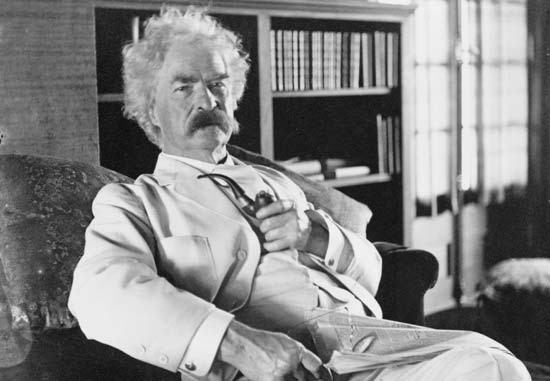
News of a plan to publish a sanitized version of Mark Twain’s classic novel
The Adventures of Huckleberry Finn
has launched a heated debate across the country, just the sort of thing the sardonic bard himself might have enjoyed.
“I think Mark Twain would love this,” says Lynda Hall, Ph.D., assistant professor, Department of English, Wilkinson College of Humanities and Social Sciences, who teaches a freshman foundations course on banned books.
At issue is the decision by NewSouth Books to publish Twain scholar
Alan Gribben’s
version of
Huckleberry Finn
that replaces the “n” word with “slave.” The
Auburn University
professor also substitutes “Indian” for “injun.” The landmark novel is often banned in schools and from curricula because of language, and the creators of
this new version
hope a cleaned-up edition will return it to the forefront of reading lists.
But better to read and teach the original text, particularly to address the world and culture Twain’s writing reflected, says Dr. Hall.
“You need to have that there so you can talk about why it was used at the time. That was the word that was used,” she said. And American publishers have been down this road before, Dr. Hall says, noting that previous editions have been published with the offending words excised.
“It’s just nothing new. We’re stupid if we let it happen,” she says.
It’s a disservice not just to Twain but to the people he wrote about, says Paul Apodaca, Ph.D., associate professor, Department of Sociology, Wilkinson. Apodaca specializes in folklore and American Indian studies.
“Mark Twain was giving power to the people by reflecting their voices, prejudices, fears and hopes in his work. The triumph of an American voice being recognized as literature is lost with these changes. The people lose to the institutions who will rewrite the book to comfort the powerful and further homogenize the human condition in their mindset. The individual genius of Mark Twain is being sacrificed for the group comfort of those who are uncomfortable with our history,” Dr. Apodoca says.
And Twain’s language choices were more than just a timely reflection, but also a signal that Huck was a changed character from the boy who first set out on that raft, says Logan Esdale, Ph.D., assistant professor,
Department of English, Wilkinson.
“Near the end of the novel, the runaway slave Jim, Huck’s companion in these adventures, sacrifices a chance at freedom to help a wounded Tom Sawyer. A doctor tending to Tom refers to Jim as a “n—.” Immediately after that, even though Huck has used (because his elders use) the n-word throughout his narrative, he obviously swerves from the doctor’s diction: he says, “I thought [Jim] had a good heart in him and was a good man,” Dr. Esdale says. “The value or sincerity of this so-called conversion can be debated, but it’s a fact that Twain set up a shift in Huck’s use of language, and left it for us to debate.”
Indeed. Have an opinion? Wonder what Twain would say? Post a comment.




Add comment